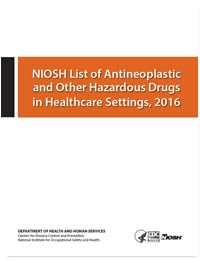NIOSH List of Antineoplastic and Other Hazardous Drugs in Healthcare Settings, 2016
This document has been superseded by document 2025-103. Please visit the link below to view the current document.
Sept 2016
DHHS (NIOSH) Publication Number 2016-161 (Supersedes 2014-138)

The NIOSH List of Hazardous Drugs in Healthcare Settings is a tool designed to assist healthcare workers and employers in identifying which drugs routinely handled by employees are considered by NIOSH to be hazardous drugs.
The NIOSH Alert: Preventing Occupational Exposures to Antineoplastic and Other Hazardous Drugs in Health Care Settings (NIOSH Pub No 2004-165) was first published in 2004. The document identified a sample list of major hazardous drugs. The list was compiled from information provided by four institutions that had generated lists of hazardous drugs for their respective institutions, as well as a list from the Pharmaceutical Research and Manufacturers of America). The 2004 list was updated in 2010, 2012 and 2014, 2016 and 2024. Some of the updates include:
- The 2010 update (NIOSH Pub No 2010—167) added 21 drugs to the original list in the 2004 Alert. Additional information for the 2010 update can be found at Peer review and public comment.
- The 2014 update (NIOSH Pub No 2014—138) added 27 drugs and includes a review of the 2004 list and the consequent removal of 12 drugs that did not meet the NIOSH criteria for hazardous drugs.
- The 2016 update (NIOSH Pub No 2016—161) added 34 drugs and includes a review of the 2004 list. This list includes drugs reviewed by NIOSH from January 2012 to December 2013. Additional information for the 2016 update can be found at Federal Register Notice.
- The 2024 update (NIOSH Pub No 2025—103) added 25 drugs, 12 with manufacturer’s special handling information, and removed 7 drugs.
To obtain a copy of the 2010, 2014 or 2016 versions please contact CDC Info 1-800-CDC-INFO (1-800-232-4636)|TTY: 1-888-232-6348 l cdc.gov/info.
May 9, 2023
The manufacturers of trabectedin (Yondelis®), inotuzumab ozogamicin (Besponsa™), polatuzumab vedotin (Polivy™), enfortumab vedotin (Padcev™), trastuzumab deruxtecan (Enhertu®), sacituzumab govitecan (Trodelvy™), loncastuximab tesirine (Zynlonta™), melphalan flufenamide (Pepaxto®), belantamab mafodotin (Blenrep), and tisotumab vedotin-tftv (Tivdak™) recommend that they be handled as hazardous drugs. Therefore, NIOSH considers these drugs to be included in Table 1 of the NIOSH list of hazardous drugs. For additional information, see the package inserts for these drugs.
| Drug | AHFS Classification | Links | Date Approved |
|---|---|---|---|
| trabectedin (Yondelis®) | 10:00 Antineoplastic Agents | DailyMed | October 23, 2015 |
| inotuzumab ozogamicin (Besponsa™) | 10:00 Antineoplastic Agents | DailyMed | August 17, 2017 |
| polatuzumab vedotin (Polivy™) | 10:00 Antineoplastic Agents | DailyMed | June 10, 2019 |
| enfortumab vedotin (Padcev™) | 10:00 Antineoplastic Agents | DailyMed | December 18,2019 |
| trastuzumab deruxtecan (Enhertu®) | 10:00 Antineoplastic Agents | DailyMed | December 20, 2019 |
| sacituzumab govitecan (Trodelvy™) | 10:00 Antineoplastic Agents | DailyMed | May 12, 2020 |
| Loncastuximab tesirine (Zynlonta™) | 10:00 Antineoplastic Agents | DailyMed | May 28, 2021 |
| melphalan flufenamide (Pepaxto®) | 10:00 Antineoplastic Agents | DailyMed | May 28, 2021 |
| belantamab mafodotin (Blenrep) | 10:00 Antineoplastic Agents | DailyMed | May 28, 2021 |
| tisotumab vedotin-tftv (Tivdak™) | 10:00 Antineoplastic Agents | DailyMed | March 23, 2022 |
| lurbinectedin (Zepzelca®) | 10:00 Antineoplastic Agents | DailyMed | May 9, 2023 |
| mirvetuximab soravtansine (ElahereTM) | 10:00 Antineoplastic Agents | DailyMed | May 9, 2023 |
January 10th, 2019
NIOSH has determined it is unlikely that risperidone (Risperidal®) poses a carcinogenic, reproductive, or developmental hazard to workers in a healthcare setting and is no longer considered a hazardous drug by NIOSH.
January 10th, 2019
NIOSH has determined it is unlikely that paliperidone (Invega®) poses a carcinogenic, reproductive or developmental hazard to workers in a healthcare setting and is no longer considered a hazardous drug by NIOSH.
April 12, 2017
NIOSH has determined that telavancin (VIBATIV®) does not meet the NIOSH definition of a hazardous drug and is no longer considered a hazardous drug by NIOSH.
